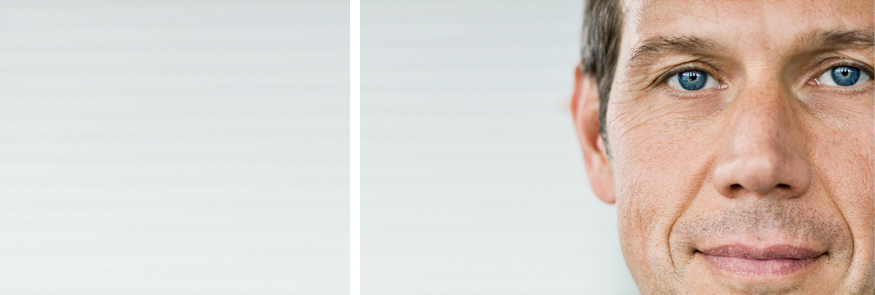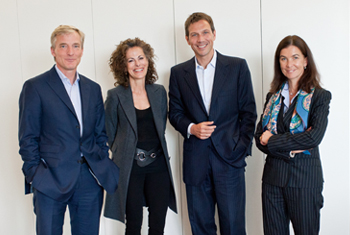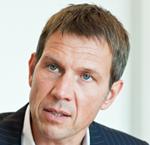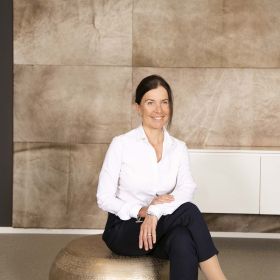Interview with René Obermann, Deutsche Telekom AG
“There are so many options that trial and error is very much the order of the day.”

René Obermann, Deutsche Telekom CEO, is allowing things to come together that have been kept apart for so long: fixed network, mobile communications and the Internet, education and entertainment, technologies and customer requirements, data networks and power networks. And what's more, he is cooperating with potential competitors. In an interview with THE FOCUS, he explains how management works in convergent markets.
More than almost any other company, Deutsche Telekom is driven by convergence – and is, at the same time, a driving force behind it. Convergence changes the corporate culture, the workforce and the man at the top. Former mobile communications devotee Obermann is now a strong opponent of self-interest. And as he’s keen to stay in touch with the workforce, he occasionally accompanies his salesforce out into the field.
Focus: We encounter convergence in many areas, ranging from mathematics and philosophy through to technology and the media. There is increasing convergence between ideologies, between social systems, and even between science and spirituality. What does convergence mean to you?
René Obermann: In our business, it means above all the growing together of Internet technology and conventional communications technologies. People carry the world’s knowledge around in their pockets. No matter where they are, they can access personal digital content such as photos, music and documents. Digitization is one of the main drivers of the convergence of products and information services that were once kept apart.
"Here, technical capabilities and customer demand merge into one."
Focus: Some experts believe that divergence is an equally powerful force. There are also systems that are straining to move part. Looking at your own field, a different approach to various media has resulted in the formation of new boundaries between social groups or age groups.
Obermann: Yes, that is equally true. Specialization is occurring in many areas, but this often extends across multiple social groups, and some of our older citizens have already joined the online community. But when we think of multimedia, we can see that the availability of digital products extends beyond the boundaries of networks and equipment. This is a fine example of convergence. Today you can do everything with your pocket-sized mobile computer – make phone calls, listen to music, surf the Net…
Focus: How does convergence come about? Through technical feasibility? Through the behavior of the end user? Or both?
Obermann: It’s more a case of technical feasibility. Technology solves a customer’s problem. For example, we don’t want to carry dozens of different devices around with us. But if the technology is not customer-focused, it is pointless. So here, technical capabilities and customer demand merge into one.
"The convergence of technologies and products is instrumental in determining the nature of our markets."
Focus: How is convergence reflected in Deutsche Telekom’s corporate strategy?
Obermann: The convergence of technologies and products is instrumental in determining the nature of our markets. Because the Internet has now found its way into our cars and cameras, it is becoming infinitely more important. There are billions of machines out there that need to communicate with one another, for example in intelligent networks in the healthcare sector, in government, in education. Mobilization of the Internet is the prime driver of our strategic alignment. In a second trend, many applications, digital products and services that are currently still running on local computers are migrating into the network, where they are being processed and stored. We call this Cloud Computing, when the computing power increasingly comes from the network.
Focus: Technology- and product convergence initially has little to do with the fact that millions of computers are virtually networked and make their computing power available to a common project. How do you explain the connection between these two trends? Can you give us any examples?
Obermann: One example can be found in Smart Grids – intelligent power networks. Another example is networking within the healthcare sector. And a third example is the networking of vehicles and traffic control. Here, we are dealing with systems which were autonomous and therefore had their limitations in the past. They only existed within the constraints of the power lines, medical care facilities and roads – to stick with my three examples. These systems are now migrating to public or “open” Internet technologies and are operated to some extent in the Cloud. This results in a huge increase in efficiency.
Focus: In your latest strategy, you define your five growth areas: mobile Internet, broadband data transmission, intelligent network services, entertainment content and T-Systems. These are the areas in which you are aiming to generate additional revenues. Do you see evidence of convergence only in these growth areas?
Obermann: Convergence is happening throughout the Group. We no longer think in terms of individual areas, but are looking at the big picture. Our main assets, such as our high-performance data centers, state-of-the-art mobile and fixed networks and service platforms, have to be integrated into these intelligent solutions. This is driven, for example, by resource bottlenecks or social problems, which might occur in the energy supply, in the health sector or in transportation. We can help to solve these problems with our technologies and products. That’s why I’m very optimistic about the need for our services.
Focus: Organizations need to realign if they are going to overcome silo thinking. How is Deutsche Telekom handling this? Perhaps you could explain with reference to intelligent power networks or Smart Grids.
Obermann: First of all, Smart Grids are part of our growth strategy. This means that the development and support of Smart Grids using our technologies and products has been identified as a top priority within the Group. A team has been given responsibility for the program and is buying in the required services and core components within the Group. The team has been authorized by senior management to roll the program out across the Group. It also acts as the interface to our partner companies, such as the Swiss power group ABB or the energy utilities.
"Product-based differentiation is a thing of the past. Instead, the structure of our organization is now determined by the needs of the customer."
Focus: Can you give us an example of convergence in the way that you manage Deutsche Telekom?
Obermann: In the past, our company was made up of divisions or silos that worked alongside one another and were relatively autonomous. We then chose to adopt the One Company concept. This required a major transformation, which we implemented in two phases. First of all, we integrated customer service in the main countries, particularly in Germany, in which we operate fixed and mobile networks. In the second phase, we decided to centralize the management of product development and of the networks in particular, as these are the areas in which the largest investments are made. In other words, we built a customer-centric organization. We created an international platform for all areas that require international scaling, and placed all areas requiring local customer contact under local responsibility. Product-based differentiation is a thing of the past. Instead, the structure of our organization is now determined by the needs of the customer.
Focus: Every company claims that it puts the customer above internal processes and interests. We know from numerous case studies that a new alignment or realignment of this type always encounters resistance within the organization. Does this match your own experience?
Obermann: Yes. This has been the most difficult process for our company in the last decade. It has also brought about the most sweeping changes to our culture. The four pillars, as they were previously known, i.e. T-Com, T-Mobile, T-Online und T-Systems, had grown autonomously and were vertically integrated, operating under their own responsibility. The management teams were preoccupied with their own management strength – no doubt all with the best of intentions. I myself used to work in the mobile division, where I frequently came across particular interests but rarely saw the big picture. When the business areas were merged, many lost their autonomy. Suddenly, they had to work for the common good, which met with resistance and resulted in personnel changes at senior management level.
Focus: How did you control this process?
Obermann: By setting clear priorities. The main one being honesty. There comes a time when you have to say to your employees: “We have now reached a decision. This is the system we want, and these are the reasons why.” We sent out countless internal communications and presented a clear picture of where we wanted to be, indicating that it would take twelve to eighteen months, for example, to create One Company in Germany. This also meant that the overall goal took priority over the people. We gave our managers the opportunity to opt out and leave if they had misgivings. This is sometimes painful, but you can’t keep everyone on board.
Focus: We assume that a new type of manager is required in the age of convergence, especially in the “TIME” industry, i.e. in the Telecommunications, Information, New Media and Electronics sector. We envisage managers with expertise in a number of technical areas who also possess a wide range of social skills. Were you able to build on a sufficient talent base in your company?
Obermann: No. We brought a lot of new managers into our company. We need a large number of competent technical staff. However, there is a severe shortage of people who can think strategically at both a general and a technological level. We need innovative product managers, product developers and software engineers with a global vision, to focus on customers and applications.
Focus: Everyone is on the lookout for this type of talent. Whether or not a company is able to attract such people also depends on its credibility. Do you have this credibility?
Obermann: We’re getting there. We have moved up a few places in the rankings for the most attractive employer. However, we’re still in the mid-range of the Top 100. And that’s not good enough. We need to make up lost ground and move ahead.
Focus: Does market success help determine the employer’s image?
Obermann: Reputation always lags some way behind market success. Surprisingly, although we have made great progress over the last few years in terms of market shares, brand acceptance and customer satisfaction, media attention is always grabbed by other issues such as scandals or the bad old monopoly days, for example. In terms of mobile revenue, we are now some way ahead of Vodafone, and in the DSLfixed network we have tripled the number of new customers compared with three years ago. Customer satisfaction has risen, and the churn rate is falling.
Focus: You have defined your growth targets up to 2015 in very precise figures. Do you also have a vision for the convergent markets based on quality criteria?
Obermann: We will be one of the market leaders in networking, in Connected Life and Work. We are providing the networks and IT platforms to achieve this. However, to our way of thinking, Connected Life and Work also means providing “enabling” solutions for the Internet economy, so that Internet products are presented in user-friendly form on the terminal equipment. This includes the wide range of primary technical products in our portfolio.
Focus: Connected Life and Work is a tall order, given that Deutsche Telekom’s traditional business touches on all aspects of life. How can a company successfully deal with so many different options?
Obermann: We need a suitably skilled workforce. And they must of course be receptive to change. Telekom is after all going through a far-reaching transformation process. Most employees understand that our markets will shrink if we just carry on doing what we have done before, i.e. our network business. But the growth areas that I have outlined offer the prospect of success for the future. Over the next five years, we are aiming to generate revenues of some EUR 30 billion in our growth areas. And that means new prospects and development opportunities for our employees.
Focus: Do you have suitable mechanisms in place to gauge employee acceptance?
Obermann: In straw polls and wider-ranging surveys, we measure acceptance not only of the value system but also of the strategy as a whole and the feasibility of its individual components. And, plain and simple, we talk to our employees. Metrics provide some answers, but I have my own personal barometer as well. My colleagues and I go out and perform our own reality checks.
Focus: How do you personally contribute towards winning people over to this transformation process?
Obermann: I talk to people all the time about where we are going and why. I want to win over hearts and minds and not just wave the flag. We want to align the company in such a way that everyone works together to achieve our goals. We have already made great progress. I try to motivate employees to give of their best.
"My earlier philosophy would not hold true today, and would no longer be appropriate. I have no problem in admitting that."

Focus: Convergence has left its mark on your career. You hail from the mobile communications sector, one of the original four pillars of Deutsche Telekom. You are now guiding the transformation process, which will ultimately result in the mobile sector losing its independence. In what ways have you changed?
Obermann: My personal attitude towards the transformation process has changed completely. In the early days, I believed that we should advance at full speed on a number of fronts, rather than follow a single, steady course. Nevertheless I readily admit that we have been gifted a golden opportunity by the convergence of technologies and by the demand from customers for convergent solutions. My earlier philosophy would not hold true today, and would no longer be appropriate. I have no problem in admitting that.
Focus: Is it possible that convergence will prove too much for any individual corporate leader? Can anyone maintain a grasp of all the strategic options and new competitive scenarios?
Obermann: Do we really have to? I think we just have to accept that we can’t plan everything down to the last detail for the next five or ten years. As we are facing so many options, we have to accept the principle of trial and error. Freedom is important, but it must not be allowed to lead to anarchy. Our company is too big to allow that to happen. We need structured and orderly processes.
Focus: Giving free rein to creative forces is surely the hallmark of a creative corporate spirit. You began your career as an entrepreneur. How do you make use of this experience now?
Obermann: I think it is important for us to develop and explore ideas. I believe that an informal and creative approach carries other people along with it. To that extent, I can act as a beacon, even if that smacks of self-praise. The honest answer to your question about using my entrepreneurial experience is that I simply don’t know. My instincts tell me that it helps me to be informal and creative and to inspire employees to think creatively and boldly.
Focus: In times of convergence, companies forge new alliances. To what extent is it good for you to open up? And how far can cooperation go?
Obermann: The concept of enablement as a business principle implies that we are willing to cooperate. But cooperation requires both sides to act fairly and benefit from working together. We cannot allow ourselves to be forced by a partner – and I mean this in general terms without referring specifically to Apple or Google – into designing our products in ways that we don’t want. And what’s more, cooperation must not, of course, restrict competition.
Focus: How do you ensure that your managers can really cope with new business models?
Obermann: Through further training, among other things. One of our top priorities is the continuous improvement of service skills within the Group, given that poor service has almost been our undoing in the past. So we have done all we can to foster process management and develop a service culture within the company. In our Service Academy we have created a key instrument for the enhancement of the service that we deliver to both internal and external customers. We also plan to set up a School of Transformation.
Focus: What are the key executive development tools for you?
Obermann: The Board of Management spends a lot of time evaluating the performance and potential of our managers. We do this very regularly and systematically, looking at each of our top managers and asking them to do the same with their own managerial staff. We attach great importance to executive development.
Focus: Still in a management context, diversity is another of your priorities. For example, you have introduced a quota for women in management. Can women manage convergence better than men?
Obermann: I consider it axiomatic for us to work in teams that are truly diverse. But I don’t see it simply as a question of men and women, but also of age groups. I can’t imagine, for example, only working together with 30 year-olds to develop products for 65 year-olds. And a 20 year-old buys different equipment than a 50 year-old who is interested in multimedia.
Focus: Some futurologists predict that the private and public spheres of life will merge into one. This, too, would be convergence. What do you think about this prediction?
Obermann: I believe that society is moving in the direction of self-determination. People require a high level of data security and do not want to fall victim to data misuse. We conducted a customer survey on this subject. It revealed that only a small number of customers are prepared to store personal data in the network. So we need to address this issue. We need to put security mechanisms in place and provide consumers with the right tools and knowledge to keep their data under control. If we don’t do this, I believe we will be failing in our duty to the customer.

The interview with René Obermann was conducted (v. l.) by Magnus Graf Lambsdorff, Egon Zehnder, Hamburg, Ulrike Mertens, THE FOCUS, and Marta Kowalska-Marrodan, Egon Zehnder, Warschau.
Resumé René Obermann

René Obermann was born in Düsseldorf in 1963, and trained as a commercial manager after finishing high school and completing his military service. He began to study economics in 1986. At the same time, he started up a business dealing in car phones and photocopiers. His rapid success as an entrepreneur led him to abandon his studies before obtaining the preliminary diploma. Obermann sold his company in 1991, but remained on the Board of Directors until 1998. Ron Sommer, Chairman of Deutsche Telekom, then hired him as General Manager Sales for the Group subsidiary T-Mobile. Obermann turned the company into the leading mobile provider in Germany and a powerful player on the international markets. In 2002, Obermann was promoted to the Board of Directors of the Deutsche Telekom Group, as head of strategy for the mobile business division. In November 2006, he succeeded Kai-Uwe Ricke as Chairman of the Board. Since then, his work has focused primarily on restructuring and crisis management. His contract ends in 2011. Obermann married TV presenter Maybrit Illner in August 2010. He has two daughters from his first marriage. Obermann is a keen runner and motorcyclist. He is a member of the governing board of the Federal Association for Information Technology, Telecommunications and New Media (Bundesverband Informationswirtschaft, Telekommunikation und neue Medien – Bitkom).
DEUTSCHE TELEKOM AG Four-in-one

Deutsche Telekom AG was founded in 1995 from the state-controlled Deutsche Bundespost – Telekom. Its Chairman Ron Sommer listed the company on the stock exchange in 1996. His “Four pillars strategy” saw the creation of companies for fixed network (T-Com), mobile (T-Mobile), Internet (T-Online) and business customers (T-Systems). Takeovers of companies such as VoiceStream and Powertel in 2001 and the auctioning of UMTS licenses racked up debts running into billions. From 2002 onwards, Sommer’s successor Kai-Uwe Ricke focused on debt reduction. Meanwhile, the fixed network was losing customers. At the end of 2005, Ricke announced the loss of 32,000 out of the 170,000 jobs in Germany. Since René Obermann took over as Chairman in November 2006, Deutsche Telekom has undergone a total restructuring. T-Com and T-Online were combined into T-Home, and T-Home and T-Mobile were merged in 2010. The Group is aiming to double its revenues by 2015 in five growth areas: mobile Internet, Entertainment, Communications, Network Solutions and Business Customers. Smart Grids, or intelligent power networks, offer an inroad into the power supply sector. In the first six months of 2010, Deutsche Telekom posted revenues of EUR 31.3 billion, with earnings of EUR 1.24 billion. The Group has 260,000 employees worldwide. The quota of women in management is scheduled to increase to 30 percent by 2015.
PHOTOS: RÜDIGER NEHMZOW





